Show different information to different users
We'll guide you to use FeatureProbe platform to create a custom feature-controlled toggle. Then we write a back-end program to verify that the back-end program requests the FeatureProbe SDK with different user information, and will get different results.
Suppose we want to implement the following scenario:
- For "VIP" users of "Shanghai", it will display "Welcome VIP customers from Shanghai"
- For "Beijing" users (without distinguishing levels), display "Welcome customers from Beijing"
- For users who do not meet the above two conditions, display "Welcome"
- Log in to the FeatureProbe demo platform. If you log in for the first time, please enter your email address. You can continue to use your email to access your data in the future.
- Click
+Toggleto create a new toggle.
- Fill in the name and key.
- Select the string type as the return variation type.
- Add three variations, fill in the name and value respectively, the value is the three different prompts we want to return.
- Select a variation when toggle is disabled.
- Click
Create and publish.
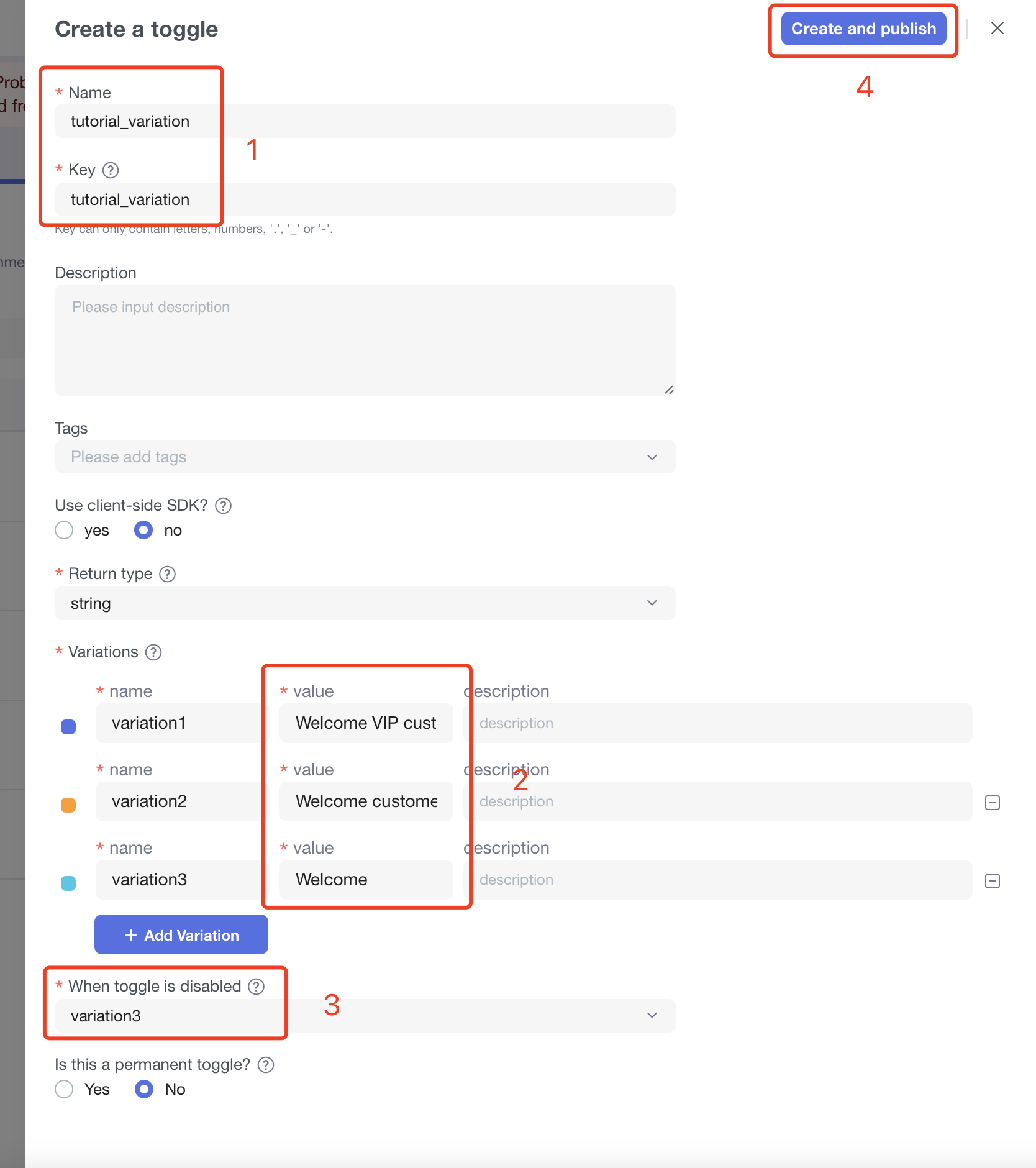
- Click to enter the targeting page of the newly created tutorial_variation toggle
- Click + Add rule to add a new rule
- Add two conditions to the rules, the city is shanghai, and the rank is VIP
- The return value is selected as variation1 (that is, the value is: welcome VIP customers from Shanghai)
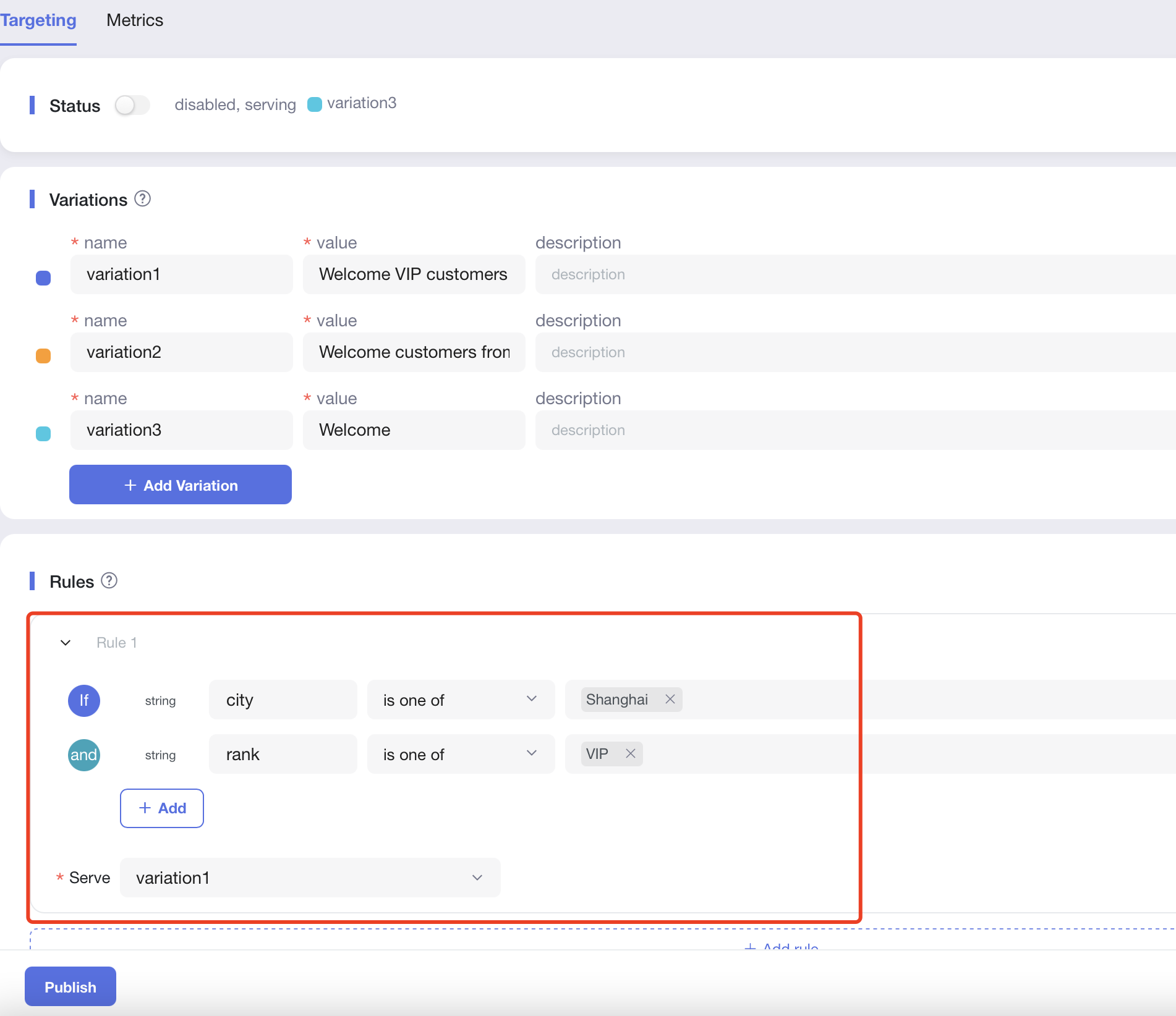
- Click
+ Add Ruleagain - Add a condition to the rule, the city is Beijing, and the return variation is selected as variation2
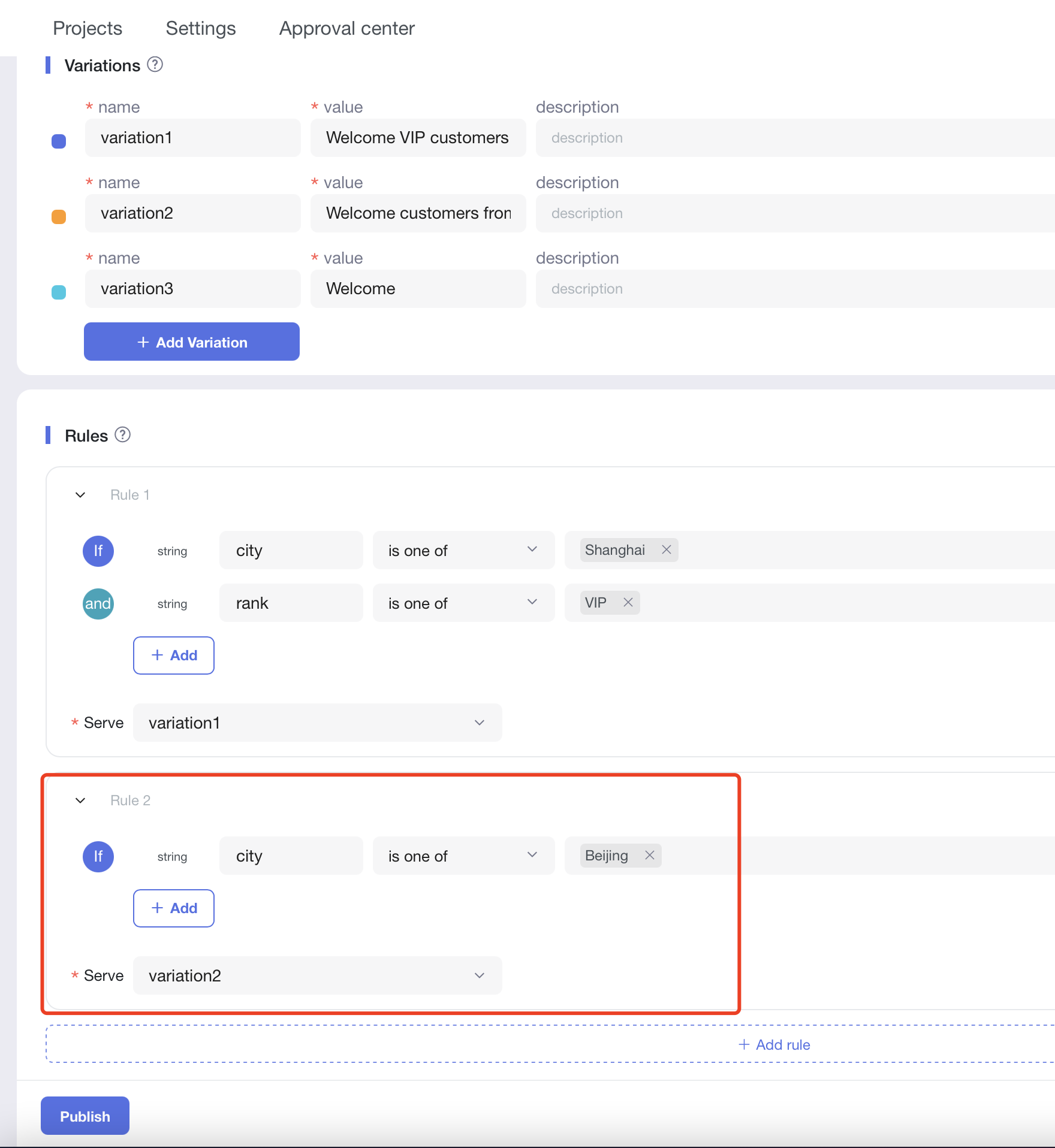
- The return variation when no rules is matched is selected as variation3
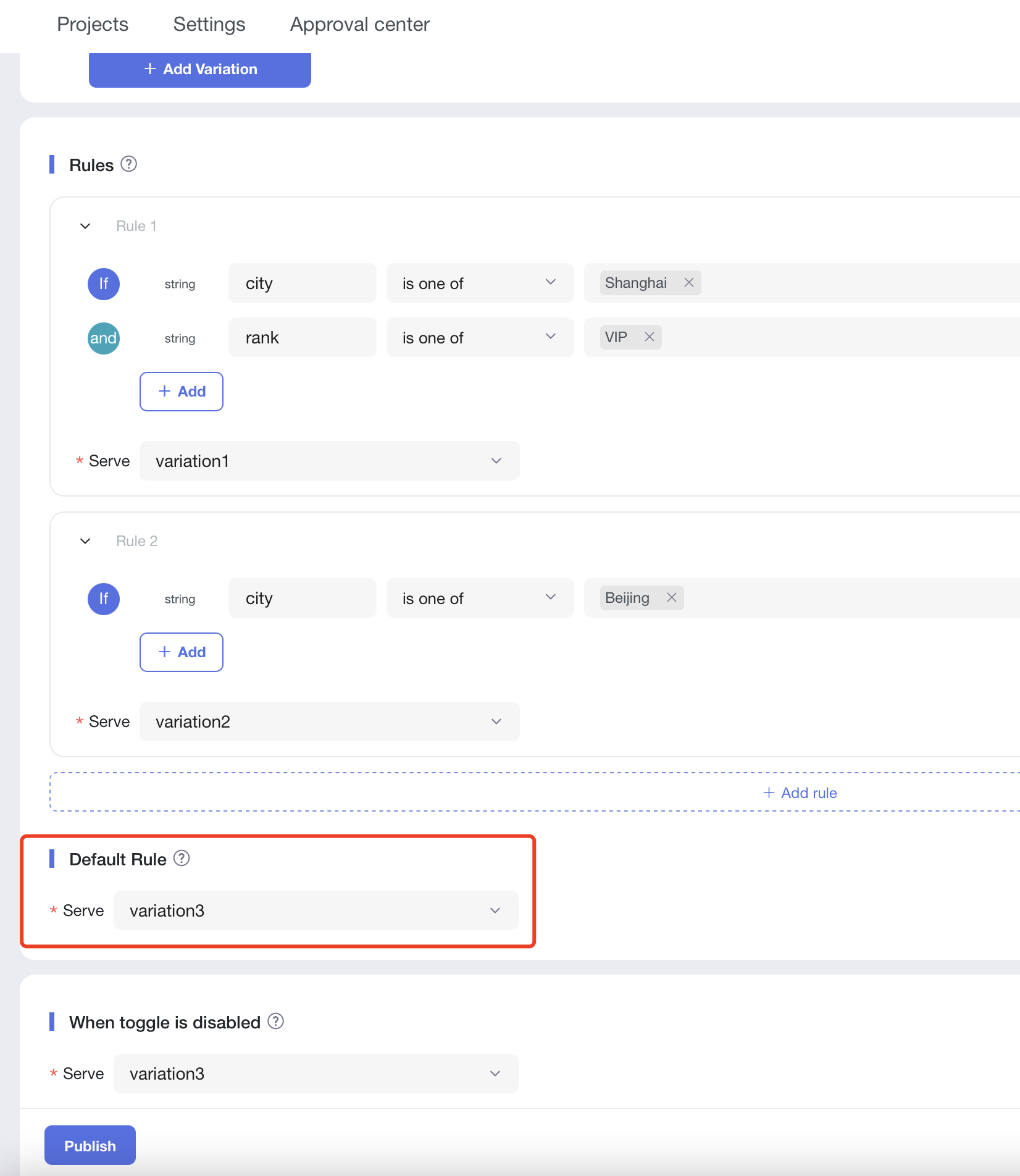
- Change the toggle status to
enabled, clickpublishbelow
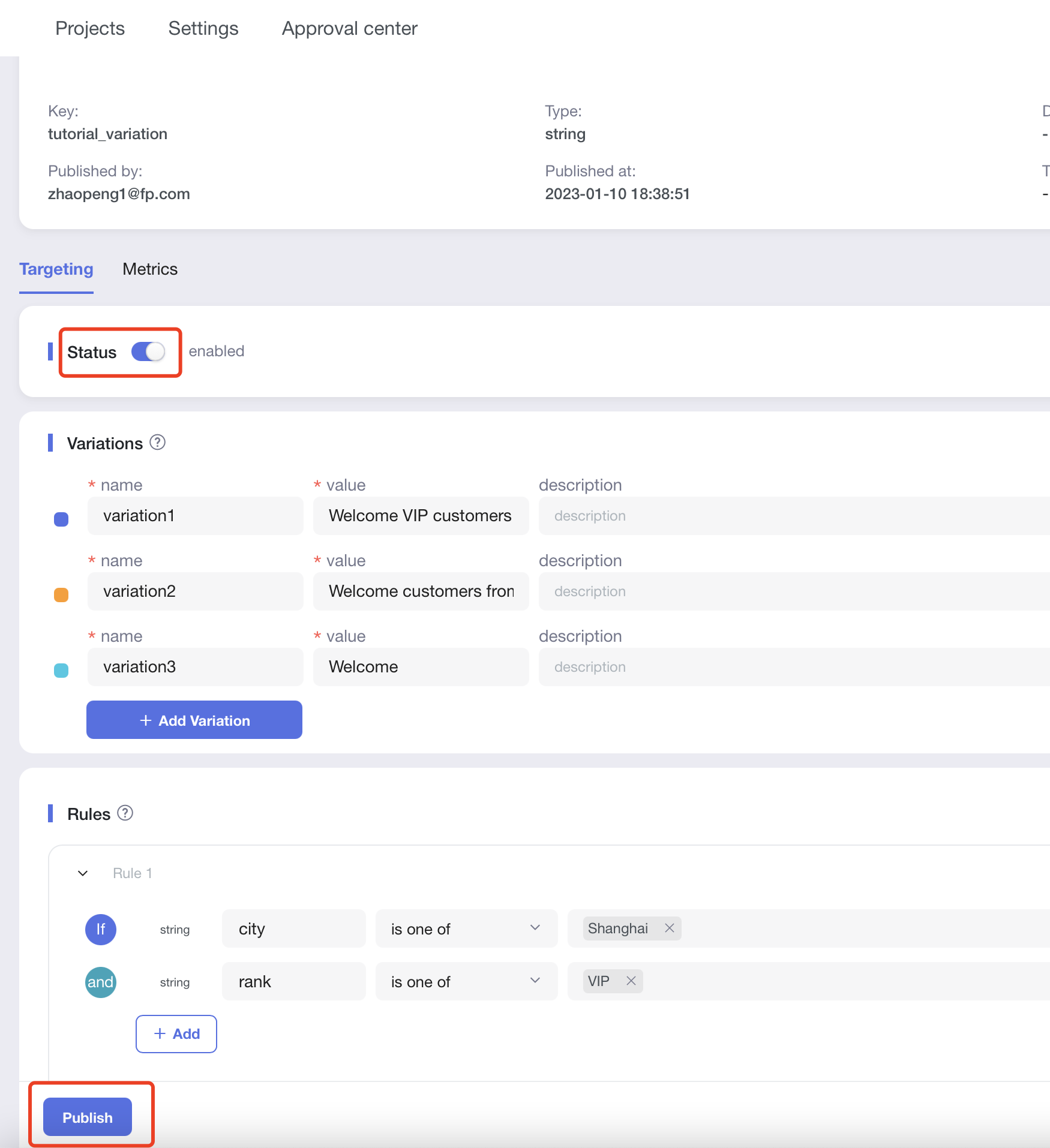
- Click
Confirmto release the toggle.
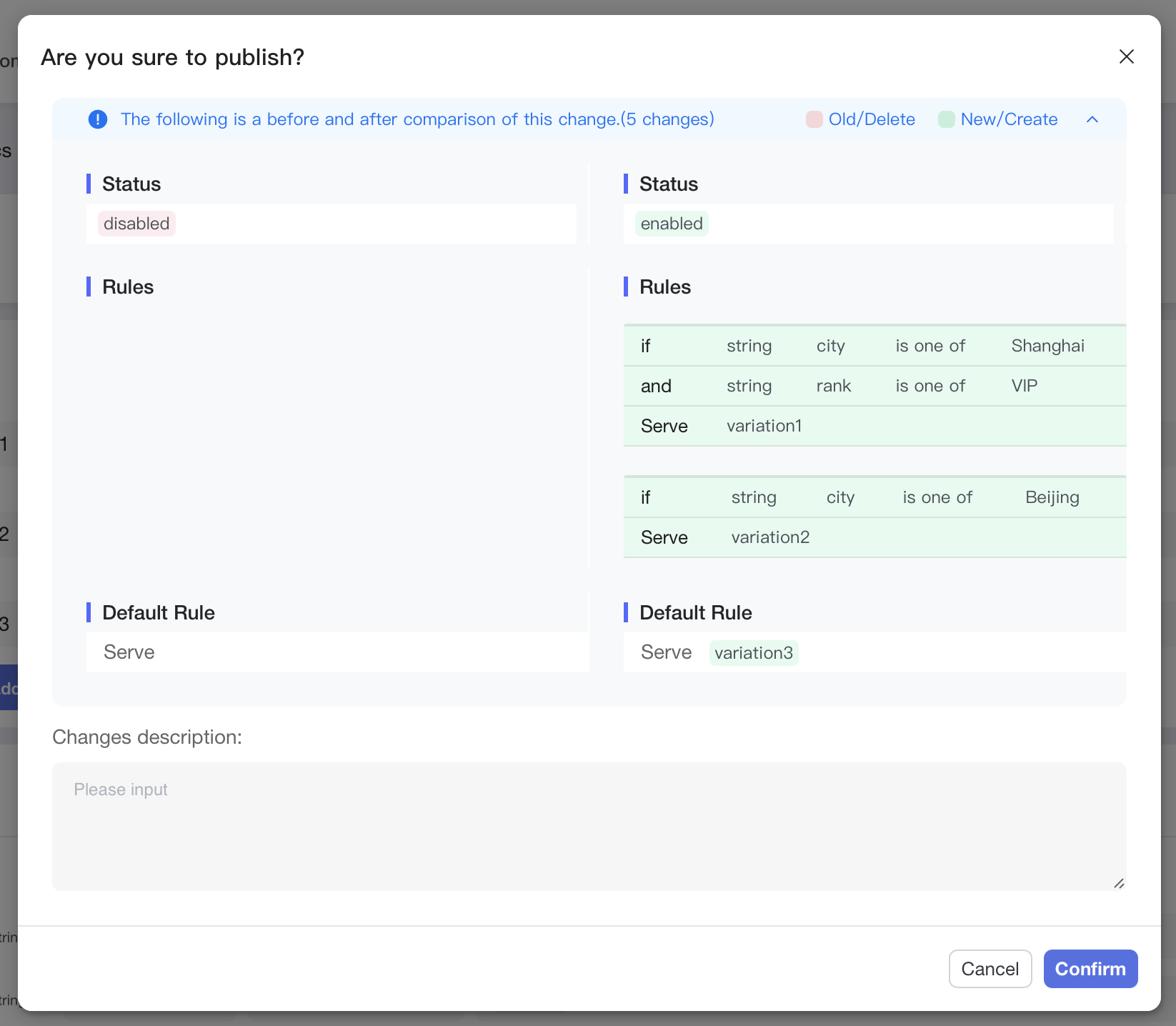
- At this point, you should see the prompt of
Published successfully

The operation on the platform is over here, the toggle has been successfully created and can be accessed. Below we introduce how to get these variation values by SDK.
Control the back-end program
We provide a backend code example, from which you can start to experience how the backend code uses the toggle.
Write code
- According to the language you are familiar with, download and open the corresponding back-end sample code.
- Java
- Go
- Rust
- Python
- Node.js
git clone https://github.com/FeatureProbe/server-sdk-java.git
cd server-sdk-java
Open src/main/java/com/featureprobe/sdk/example/FeatureProbeDemo.java file with an editor.
git clone https://github.com/FeatureProbe/server-sdk-go.git
cd server-sdk-go
Open the example/main.go file with an editor.
git clone https://github.com/FeatureProbe/server-sdk-rust.git
cd server-sdk-rust
Open the examples/demo.rs file with an editor.
git clone https://github.com/FeatureProbe/server-sdk-python.git
cd server-sdk-python
Open the demo.py file with an editor.
git clone https://github.com/FeatureProbe/server-sdk-node.git
cd server-sdk-node
Open the example/demo.js file with an editor.
Open the FeatureProbe platform projects page, you can click
Projectson the toggle targeting page to open:
Copy
Server SDK Key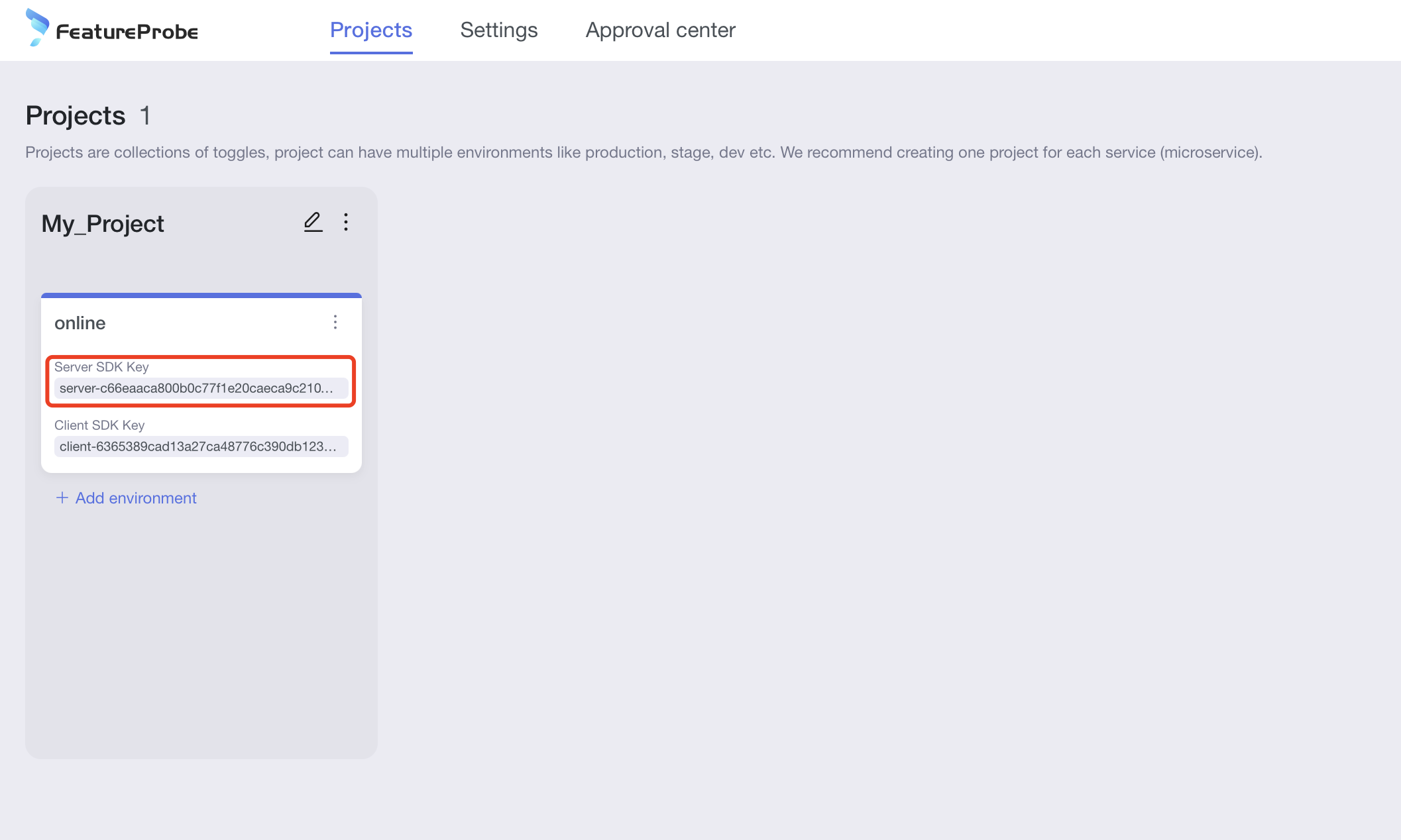
Fill in
Server SDK KeyandFeatureProbe remote URL("https://featureprobe.io/server") into the corresponding variables of the backend code
- Java
- Go
- Rust
- Python
- Node.js
private static final String FEATURE_PROBE_SERVER_URL = "https://featureprobe.io/server";
private static final String FEATURE_PROBE_SERVER_SDK_KEY = // Fill in the server SDK key
config := featureprobe.FPConfig{
RemoteUrl: "https://featureprobe.io/server",
ServerSdkKey: // Fill in the server SDK key
RefreshInterval: 5000, // ms
WaitFirstResp: true,
}
let remote_url = "https://featureprobe.io/server";
let server_sdk_key = // Fill in the server SDK key
FEATURE_PROBE_SERVER_URL = 'https://featureprobe.io/server'
FEATURE_PROBE_SERVER_SDK_KEY = # Fill in the server SDK key
const FEATURE_PROBE_SERVER_URL = 'https://featureprobe.io/server';
const FEATURE_PROBE_SERVER_SDK_KEY = // Fill in the server SDK key
- Add the following code to simulate five users accessing this toggle
- VIP users from Shanghai
- Gold users form Shanghai
- VIP users form Beijing
- Gold users form Beijing
- VIP users form Tianjin
- Java
- Go
- Rust
- Python
- Node.js
public static void main(String[] args) throws IOException {
Logger root = (Logger)LoggerFactory.getLogger(org.slf4j.Logger.ROOT_LOGGER_NAME);
root.setLevel(Level.WARN);
final FPConfig config = FPConfig.builder()
.remoteUri(FEATURE_PROBE_SERVER_URL)
.build();
// Init FeatureProbe, share this FeatureProbe instance in your project.
final FeatureProbe fpClient = new FeatureProbe(FEATURE_PROBE_SERVER_SDK_KEY, config);
FPUser[] users = {
new FPUser().with("city", "Shanghai").with("rank", "VIP"),
new FPUser().with("city", "Shanghai").with("rank", "Gold"),
new FPUser().with("city", "Beijing").with("rank", "VIP"),
new FPUser().with("city", "Beijing").with("rank", "Gold"),
new FPUser().with("city", "Tianjin").with("rank", "VIP"),
};
for (FPUser user:users) {
String greeting = fpClient.stringValue("tutorial_variation", user, "Welcome");
System.out.println(greeting);
}
fpClient.close();
}
func main() {
config := featureprobe.FPConfig{
RemoteUrl: "https://featureprobe.io/server",
ServerSdkKey: // Fill in the server SDK key
RefreshInterval: 5000, // ms
WaitFirstResp: true,
}
fp, err := featureprobe.NewFeatureProbe(config)
if err != nil {
fmt.Println(err)
return
}
users := []featureprobe.FPUser{
featureprobe.NewUser().With("city", "Shanghai").With("rank", "VIP"),
featureprobe.NewUser().With("city", "Shanghai").With("rank", "Gold"),
featureprobe.NewUser().With("city", "Beijing").With("rank", "VIP"),
featureprobe.NewUser().With("city", "Beijing").With("rank", "Gold"),
featureprobe.NewUser().With("city", "Tianjin").With("rank", "VIP"),
}
for _, user := range users {
greeting := fp.StrValue("tutorial_variation", user, "Welcome")
fmt.Println(greeting)
}
fp.Close()
}
#[tokio::main]
async fn main() {
let remote_url = "https://featureprobe.io/server";
let server_sdk_key = // Fill in the server SDK key
let config = FPConfig {
remote_url: remote_url.to_owned(),
server_sdk_key: server_sdk_key.to_owned(),
refresh_interval: Duration::from_millis(2000),
..Default::default()
};
let fp = match FeatureProbe::new(config) {
Ok(fp) => fp,
Err(e) => {
tracing::error!("{:?}", e);
return;
}
};
let users = [
FPUser::new().with("city", "Shanghai").with("rank", "VIP"),
FPUser::new().with("city", "Shanghai").with("rank", "Gold"),
FPUser::new().with("city", "Beijing").with("rank", "VIP"),
FPUser::new().with("city", "Beijing").with("rank", "Gold"),
FPUser::new().with("city", "Tianjin").with("rank", "VIP")
];
for user in users {
let greeting = fp.string_value("tutorial_variation", &user, "Welcome".to_string());
println!("{:?}", greeting);
}
fp.close();
}
logging.basicConfig(level=logging.WARNING)
if __name__ == '__main__':
FEATURE_PROBE_SERVER_URL = 'https://featureprobe.io/server'
FEATURE_PROBE_SERVER_SDK_KEY = # Fill in the server SDK key
config = fp.Config(remote_uri=FEATURE_PROBE_SERVER_URL, # FeatureProbe server URL
sync_mode='polling',
refresh_interval=3)
with fp.Client(FEATURE_PROBE_SERVER_SDK_KEY, config) as client:
users = [
fp.User().with_attr("city", "Shanghai").with_attr("rank", "VIP"),
fp.User().with_attr("city", "Shanghai").with_attr("rank", "Gold"),
fp.User().with_attr("city", "Beijing").with_attr("rank", "VIP"),
fp.User().with_attr("city", "Beijing").with_attr("rank", "Gold"),
fp.User().with_attr("city", "Tianjin").with_attr("rank", "VIP")
]
for user in users:
greeting = client.value('tutorial_variation', user, default="Welcome")
print(greeting)
const fpClient = new featureProbe.FeatureProbe({
remoteUrl: FEATURE_PROBE_SERVER_URL,
serverSdkKey: FEATURE_PROBE_SERVER_SDK_KEY,
refreshInterval: 5000,
});
const users = [
new featureProbe.FPUser().with("city", "Shanghai").with("rank", "VIP"),
new featureProbe.FPUser().with("city", "Shanghai").with("rank", "Gold"),
new featureProbe.FPUser().with("city", "Beijing").with("rank", "VIP"),
new featureProbe.FPUser().with("city", "Beijing").with("rank", "Gold"),
new featureProbe.FPUser().with("city", "Tianjin").with("rank", "VIP"),
];
for(let i = 0; i < users.length; i++) {
const greeting = fpClient.stringValue("tutorial_variation", users[i], "Welcome");
console.log(greeting);
}
The user's attributes (for example: city, rank) need to be obtained by the developer in the business code in other ways, and then passed to the FeatureProbe SDK through the with method. The SDK is only responsible for applying rules to these users, The SDK cannot infer the user's attributes internally by itself.
- Run the program
- Java
- Go
- Rust
- Python
- Node.js
mvn package
java -jar ./target/server-sdk-java-1.4.0.jar
go run example/main.go
cargo run --example demo
pip3 install -r requirements.txt
python3 demo.py
node demo.js
Validate result
As can be seen from the command line log, for the following five test users:
- VIP users from Shanghai
- Gold users form Shanghai
- VIP users form Beijing
- Gold users form Beijing
- VIP users form Tianjin
apply rules
- For "VIP" users of "Shanghai", it will display "Welcome VIP customers from Shanghai"
- For "Beijing" users (without distinguishing levels), display "Welcome customers from Beijing"
- For users who do not meet the above two conditions, display "Welcome"
After that, the following results were obtained:
Welcome VIP customers from Shanghai
welcome
Welcome customers from Beijing
Welcome customers from Beijing
welcome
You can change the code, try more combinations of user attributes, and see if the results displayed in the log meet the conditions.
Control the front-end program
We provide a front-end js code example, and you can start to experience how the front-end code uses toggles from here.
Write code
- Download the sample code
git clone https://github.com/FeatureProbe/client-sdk-js.git
cd client-sdk-js
- Open platform to get client sdk key
Click the "Projects" tab to enter the "Projects" list, obtain various SDK keys, and modify project and environment information.
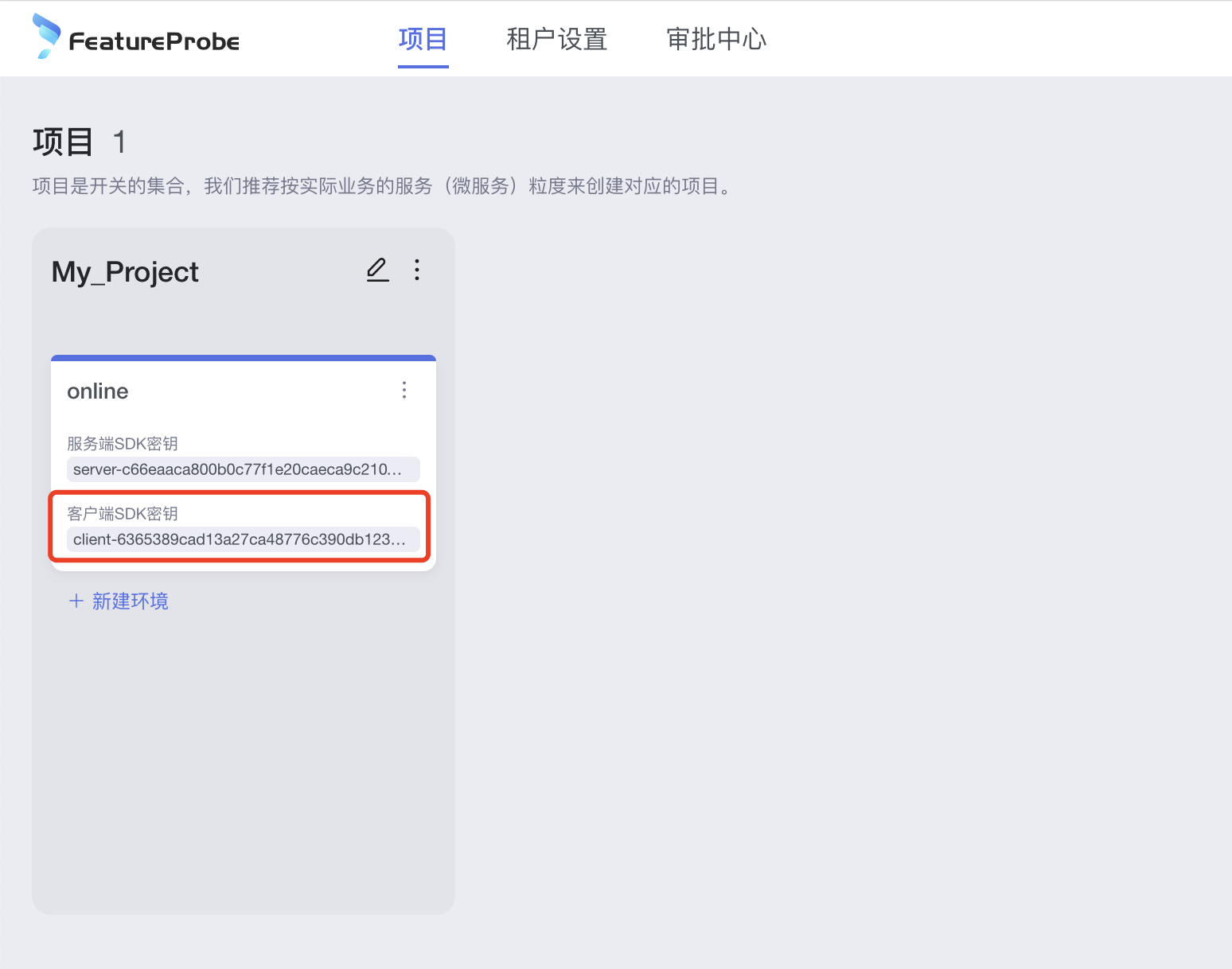
- Open
example/index.htmland fill inClient SDK KeyandFeatureProbe URL("https://featureprobe.io/server")
const fpClient = new featureProbe. FeatureProbe({
remoteUrl: "https://featureprobe.io/server",
clientSdkKey: // Paste client sdk key here,
user,
refreshInterval: 5000,
});
- Simulate the "VIP" user from "Shanghai" to access the toggle
tutorial_variationand get the toggle result directly
<script>
const user = new featureProbe.FPUser().with("city", "Shanghai").with("rank", "VIP");
const fpClient = new featureProbe. FeatureProbe({
remoteUrl: "https://featureprobe.io/server",
clientSdkKey: // Paste client sdk key here,
user,
refreshInterval: 5000,
});
fpClient.start();
fpClient.on("ready", function() {
const stringValue = fpClient.stringValue("tutorial_variation", "Welcome");
document.getElementById("string-result").innerText = stringValue;
});
</script>
Validate result
Open index.html in the browser, and you can see that for the current "Welcome VIP customers from Shanghai".
string type
FeatureProbe evaluation string type toggle result is : Welcome VIP customers from Shanghai
You can go back to the index.html file and update the with parameter to see the difference in the return variation value.
const user = new featureProbe.FPUser().with("city", "Beijing").with("rank", "VIP");